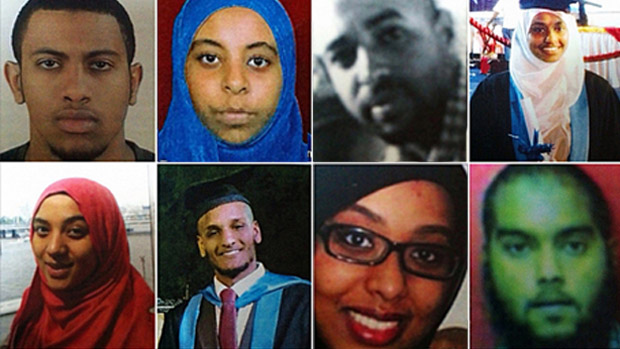Nine British medics feared to be working with Islamic State
Turkish politician claims the group was 'cheated' and 'brainwashed' into offering IS their help

A free daily email with the biggest news stories of the day – and the best features from TheWeek.com
You are now subscribed
Your newsletter sign-up was successful
Nine British medical students believed to be working with Islamic State in hospitals in a militant-controlled area of Syria have been urged to return home by their families.
The four women and five men, aged in their late teens and early 20s, had been studying at a medical school in Sudan. They flew from the country's capital of Khartoum to Istanbul on 12 March and reportedly crossed the border into Syria last week.
The group kept their plans secret from relatives until 19-year-old Lena Maumoon Abdulqadir (pictured above, bottom left) sent a brief message to her sister, alerting her family of her whereabouts. In the message, Abdulqadir said she wanted to "volunteer to help wounded Syrian people".
The Week
Escape your echo chamber. Get the facts behind the news, plus analysis from multiple perspectives.

Sign up for The Week's Free Newsletters
From our morning news briefing to a weekly Good News Newsletter, get the best of The Week delivered directly to your inbox.
From our morning news briefing to a weekly Good News Newsletter, get the best of The Week delivered directly to your inbox.
The others have been named as (pictured clockwise from left) Hisham Mohammed Fadlallah, Tasneem Suleyman Huseyin, Ismail Hamadoun, Nada Sami Kader, Mohamed Osama Badri Mohammed, Rowan Kamal Zine El Abidine, Tamer Ahmed Ebu Sebah and Sami Ahmed Kadir (not pictured).
Turkish opposition politician Mehmet Ali Ediboglu told The Observer that the group is likely to be in Tel Abyad, an IS-controlled border town east of Kobane. He has been speaking to the families, who travelled to Turkey in hope of bringing their children home.
"The conflict out there is fierce, so medical help must be needed," he said. "They have been cheated, brainwashed. That is what I, and their relatives, think."
He added that the case was "a little bit different" to previous examples of foreigners joining IS because the young people were medics and "went there to help, not to fight".
A free daily email with the biggest news stories of the day – and the best features from TheWeek.com
The nine Britons, who were studying in Sudan to experience "a more Islamic culture", are believed to be with two other medics, one American-Sudanese and one Canadian-Sudanese, says the BBC.
BBC Turkey correspondent Mark Lowen says the fear is that they may have been radicalised and recruited by IS in Sudan.
According to the Home Office, they would not automatically face prosecution if they returned to the UK if they could show that they had not been fighting.
-
 The ‘ravenous’ demand for Cornish minerals
The ‘ravenous’ demand for Cornish mineralsUnder the Radar Growing need for critical minerals to power tech has intensified ‘appetite’ for lithium, which could be a ‘huge boon’ for local economy
-
 Why are election experts taking Trump’s midterm threats seriously?
Why are election experts taking Trump’s midterm threats seriously?IN THE SPOTLIGHT As the president muses about polling place deployments and a centralized electoral system aimed at one-party control, lawmakers are taking this administration at its word
-
 ‘Restaurateurs have become millionaires’
‘Restaurateurs have become millionaires’Instant Opinion Opinion, comment and editorials of the day
-
 Epstein files topple law CEO, roil UK government
Epstein files topple law CEO, roil UK governmentSpeed Read Peter Mandelson, Britain’s former ambassador to the US, is caught up in the scandal
-
 Iran and US prepare to meet after skirmishes
Iran and US prepare to meet after skirmishesSpeed Read The incident comes amid heightened tensions in the Middle East
-
 Israel retrieves final hostage’s body from Gaza
Israel retrieves final hostage’s body from GazaSpeed Read The 24-year-old police officer was killed during the initial Hamas attack
-
 China’s Xi targets top general in growing purge
China’s Xi targets top general in growing purgeSpeed Read Zhang Youxia is being investigated over ‘grave violations’ of the law
-
 Panama and Canada are negotiating over a crucial copper mine
Panama and Canada are negotiating over a crucial copper mineIn the Spotlight Panama is set to make a final decision on the mine this summer
-
 Why Greenland’s natural resources are nearly impossible to mine
Why Greenland’s natural resources are nearly impossible to mineThe Explainer The country’s natural landscape makes the task extremely difficult
-
 Iran cuts internet as protests escalate
Iran cuts internet as protests escalateSpeed Reada Government buildings across the country have been set on fire
-
 US nabs ‘shadow’ tanker claimed by Russia
US nabs ‘shadow’ tanker claimed by RussiaSpeed Read The ship was one of two vessels seized by the US military